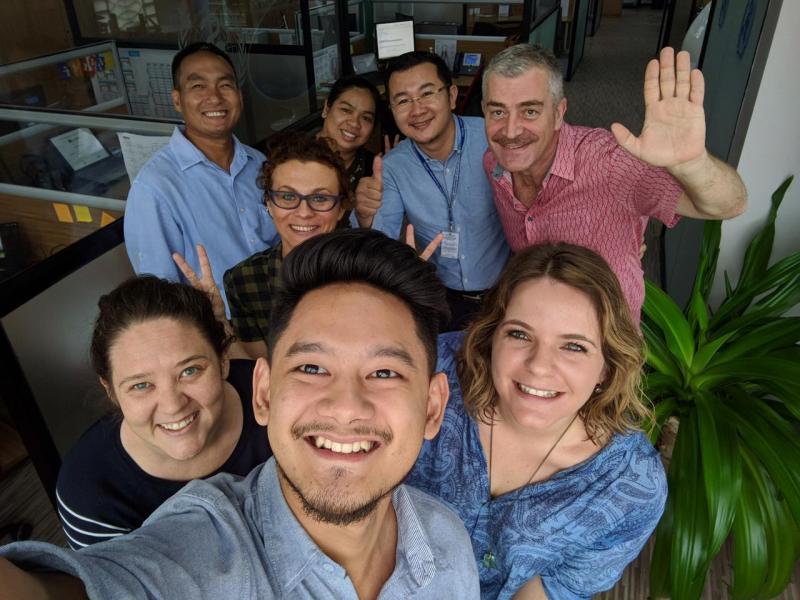
Australian Health Security Corps committed to people-centred public health in Cambodia
November 29, 2018
Western Pacific Region
Cambodia
The Indo-Pacific Centre’s Health Security Corps deployed two Australian volunteers to work with the United Nations (UN) World Health Organization (WHO) in Cambodia as part of Australian Government’s Health Security Initiativefor the Indo-Pacific Region. Stephanie Wheeler worked as a Technical Officer (Health Security) and Yasmin Lisson worked as the Epidemiology Officer between July 2017 and July 2018, as part of the Australian Volunteers Program, an Australian Government initiative and a key component of Australia’s aid program. Here, they talk about the challenges and achievements of their assignments, but also how, above all else, public health is delivered with a true commitment to leaving no-one behind.
“Health security is a really interesting area, because it looks at disease as being more expansive than simply pathology; it is the intersection of disease within the complex web of economic, social, political, environmental, cultural and religious factors in which we live,” says Stephanie.
“It’s looking at the fact that a pathogen can move from one side of the world to the other in less than 24 hours; that the world is becoming simultaneously larger and smaller, and how we mitigate the impacts of this in terms of health,” she continues.
In Cambodia, WHO works alongside the Ministry of Health (MoH) to strengthen capacity for the prevention, surveillance, detection, reporting and response to public health events.
Stephanie and Yasmin worked with MoH to implement of a range of systems and activities, including developing guidelines and risk communication plans, initiating the new Incident Management System, and supporting the annual review of the International Health Regulations (2005) and Cambodia’s National Work Plan (2016-2020).
For Stephanie, an assignment highlight was, “having the opportunity to join a team of malaria experts to reach forest-workers at risk of malaria in remote provinces.” For Yasmin, it was working as a supervisor in the Field Epidemiology Training Programme.
Yasmin reflects on the strong relationships she formed with colleagues at WHO:
“My colleagues are fiercely passionate people,” she says. “They love what they do and are a driving force behind many of the major initiatives in place to strengthen Cambodia’s health system. They come from a variety of professions yet are all equally dedicated to ensuring Cambodians have access to quality health services where and when they need it.”
Stephanie had a similar experience with her colleagues at WHO, saying:
“I’ve learned a lot of technical things from my colleagues, but what I’ve enjoyed most is the support and camaraderie amongst our team. Our work can be difficult and stressful, but we always make time to have a laugh and take care of each other as people first. We are always people first,” she says.
Though significant achievements were made on assignment, both Stephanie and Yasmin say that being a woman in the health sector was one of the biggest challenges they faced while on assignment. Stephanie and Yasmin had to work hard to work hard to build relationships and trust, demonstrate technical expertise in their work, and commitment to working to strengthen the public health system in a sector where the majority of doctors are male.
Despite this, both Stephanie and Yasmin say their experience was overwhelmingly positive.
“I believe assignments like mine help establish strong links between WHO and the Australian Volunteers Program, which paves the way for more Australian volunteers to take up positions in future,” says Yasmin.
Stephanie adds that the experience has made her a more passionate advocate for women.
“I’m really passionate about seeing women in leadership, and committed to advocating for my female colleagues in pursuing decision-making roles, and roles of influence in their public health careers,” she says.
Yasmin, now back in Australia and reflecting on how her assignment helps foster a safer and more cohesive region.
“Australia has both a humanitarian and strategic interest in building the capacity of countries in our region to prepare and respond to high threat diseases of pandemic and epidemic potential.”
“My role contributes to a safer region through strong international partnerships, investing in, and working closely with, partner government systems. It focused on achieving significant and sustainable results that build our region’s resilience to health security challenges,” she concludes.